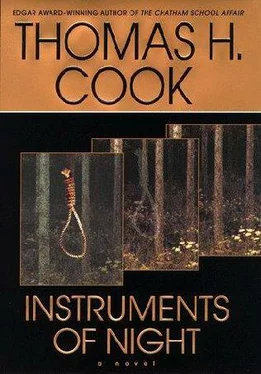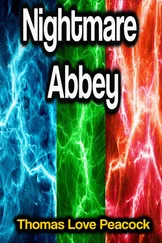Thomas Cook - Instruments of Night
Здесь есть возможность читать онлайн «Thomas Cook - Instruments of Night» весь текст электронной книги совершенно бесплатно (целиком полную версию без сокращений). В некоторых случаях можно слушать аудио, скачать через торрент в формате fb2 и присутствует краткое содержание. Жанр: Триллер, на английском языке. Описание произведения, (предисловие) а так же отзывы посетителей доступны на портале библиотеки ЛибКат.
- Название:Instruments of Night
- Автор:
- Жанр:
- Год:неизвестен
- ISBN:нет данных
- Рейтинг книги:3 / 5. Голосов: 1
-
Избранное:Добавить в избранное
- Отзывы:
-
Ваша оценка:
- 60
- 1
- 2
- 3
- 4
- 5
Instruments of Night: краткое содержание, описание и аннотация
Предлагаем к чтению аннотацию, описание, краткое содержание или предисловие (зависит от того, что написал сам автор книги «Instruments of Night»). Если вы не нашли необходимую информацию о книге — напишите в комментариях, мы постараемся отыскать её.
Instruments of Night — читать онлайн бесплатно полную книгу (весь текст) целиком
Ниже представлен текст книги, разбитый по страницам. Система сохранения места последней прочитанной страницы, позволяет с удобством читать онлайн бесплатно книгу «Instruments of Night», без необходимости каждый раз заново искать на чём Вы остановились. Поставьте закладку, и сможете в любой момент перейти на страницу, на которой закончили чтение.
Интервал:
Закладка:
He felt his agitation spike suddenly, a name leap inside him. He quickly stood, took a deep breath, and let the silence surround him. Looking out over the grounds, he was relieved that there were no boats on the water, no campers at the picnic tables, no sounds but what came from the night birds and insects, no movement but the wind through the dense trees and over the otherwise placid water. The stillness sank into him like a drug. Silence, final and eternal, seemed all he yearned for now.
He remained there for a long time, breathing slowly, struggling to climb back onto the ledge he lived upon. In the distance he could see the manor house of Riverwood as it rested grandly on its green hill, silent, princely, surveying its domain. He had never been inside so great a house, save the one his imagination had created. Malverna. Ammon Kessler’s ancestral home. A honeycomb of dungeons and laboratories, dripping chambers fitted with chains and hooks, webs of rope and pulleys. The place where the old woman in the bus station would no doubt have spent her last hours had the tale continued. He could see her strapped to a metal table fitted with drains on either side, her tortured eyes darting desperately right and left as Kessler shouted his orders, slapping the back of Sykes’ head or pinching his ears, using tiny bites of pain to remind his shivering slave of the deeper and more protracted agony he could, at will, inflict.
Graves closed his eyes, drawing down the curtain on a story whose grisly progress he had no wish to imagine.
The darkness had deepened further by the time he opened them again. The sweet smell of mountain laurel drew him helplessly back to the summer following his parents’ death, that night when, as a boy of twelve, he’d approached his own house from the nightbound fields. Once again he could hear the crickets and cicadas, smell the blackberry cobbler bubbling in the kitchen oven, feel the hoe as it bumped against his bare shoulder. He’d been at work all that long day, hoeing a distant field in the relentless Carolina heat. At noon Gwen had made the long walk from the house to the field, bringing him his lunch, a ham and cheese sandwich, iced tea in a Mason jar. They’d talked companionably while he ate, sitting together under the old elm, a sultry summer breeze playing through Gwen’s chestnut hair. She’d left an hour later, pausing where the woods rose up at the far end of the field, waving to him before she’d turned and entered them. After that he’d gone back to his work, carefully weeding the rows of corn and beans and green pepper until the end of day.
By seven, with the sun lowering, he’d finished the last row, slung his hoe over his aching shoulder, and begun the long walk home. He was tired, but it was a good tiredness, one that made him feel older than his years, the “man of the house” his father had instructed him to be.
Night had already fallen by the time he’d closed in upon the spare, isolated farmhouse he’d lived in all his life. That’s why it had struck him as so strange, the fact that as he’d drawn in upon the house, the light Gwen always kept burning for him on the back porch, a shining beacon to guide him home, had suddenly winked out.
CHAPTER 3
As Graves opened the cottage door he recognized that it was not a servant who’d brought breakfast to him. The woman was tall and slender, her silver hair pulled tightly back and secured by a small jeweled clasp. Her eyes were large, gray, perfectly round, and set in a face that seemed sculpted from pale stone. Only the fullness of her lips gave it a touch of sensuousness. A daub of rouge had been applied to her cheeks, but only enough to give them the faintest sense of color, hardly more noticeable than the studiedly modest white pearls in her earlobes.
“Good morning, Mr. Graves,” she said. “I’m Allison Davies.”
She was dressed in a style that struck Graves as elegantly informal, a loose-fitting white blouse and khaki trousers. Even so, she gave off an aura of command. Graves could hear it in her voice and see it in her manner. He was sure the confidence of wealth and power also lay like a fine varnish on the desk in her office and floated invisibly beneath the Tiffany lamp in her sitting room. He saw delicate lace curtains in a large dining room, heard the tinkle of French chandeliers, sniffed the faint musty odor of leather-bound books, and instantly imagined a whole family history to go with such luxurious things, a kind of Hudson Valley version of The Magnificent Ambersons, but tinged with that dread and sense of imminent horror that darkened Graves’ every creative thought, turned every place into some more subtle version of Malverna, every person into Kessler, Sykes, or one of the hapless strangers they’d worked their worst upon.
“I’ve brought your breakfast,” Miss Davies added. She offered a smile, but it was a quick, tentative one, and Graves immediately suspected that despite her wealth she’d known considerable distress, borne the weight of grave responsibilities. There were certain forms of anxiety she would never know, of course, but there were others she would in no way be able to escape. One of Kessler’s idle meditations occurred to him: Money rids the rich of none but vulgar care. He opened the screen door.
But she did not step inside. “I thought you might take it in the open air,” she said. “The table by the pond. I’d like to talk with you, Mr. Graves.”
“All right,” Graves said with some relief. He’d not slept well. The rural look of the cottage too easily recalled the Carolina farmhouse he’d lived in as a boy, the final scenes he’d witnessed there. He was happy to escape it.
They walked to a wooden picnic table beside the lake and sat down opposite each other. Graves placed his hands on its rough wooden surface, suddenly heard straps of rope slapping against its legs, and quickly drew his hands into his lap.
“Well, I guess you’ve been wondering why I asked you here to Riverwood,” Miss Davies said as she pressed the breakfast tray toward Graves.
Graves glanced at the food without appetite.
“To begin with, I’ve followed your work for quite some time,” Miss Davies told him. “A young college student who once spent the summer here first recommended your novels to me. Evidently you’re somewhat popular with college students.”
Graves did not dispute such “popularity,” though he knew that it had been severely limited, little more than a brief flirtation. At first he’d suspected that his student admirers had been drawn to his books by the icy nihilism they found in them. Kessler was their spokesman, rather than Slovak. Later he’d entertained the darker possibility that youthful readers had been attracted to his writing by Kessler’s sadism. The way he ordered Sykes to commit vicious injuries, then sat back and watched the whole terrible ordeal as if it were really Sykes who was the subject of the experiment. When he allowed himself to ponder it, Graves feared that it was precisely this aspect of his books to which his “fans” were drawn, Kessler’s relendess effort to invent a cruelty so hideous, Sykes would finally refuse to enact it, take the pain himself radier than inflict it.
“I must admit that I was rather skeptical,” Miss Davies went on. “After all, different generations don’t usually have the same literary tastes.” She smiled. “But on the whole, I was quite impressed. Particularly by the way you come up with strange dynamics. For your characters, I mean. Their reasons for doing things are sometimes quite unexpected, and yet, once revealed, their motivations seem entirely believable.”
Graves could tell by the somber look in her eyes that this last remark had not been meant to flatter him. Allison Davies was not a fan. She had invited him to Riverwood for one particular facet of his writing, the part that bored into life’s secret festering. It was the darker impulses that interested her, Graves thought. The serpents in the grass. Once again he heard Kessler’s arctic whisper: It is life itself that smiles and smiles… and is a villain.
Читать дальшеИнтервал:
Закладка:
Похожие книги на «Instruments of Night»
Представляем Вашему вниманию похожие книги на «Instruments of Night» списком для выбора. Мы отобрали схожую по названию и смыслу литературу в надежде предоставить читателям больше вариантов отыскать новые, интересные, ещё непрочитанные произведения.
Обсуждение, отзывы о книге «Instruments of Night» и просто собственные мнения читателей. Оставьте ваши комментарии, напишите, что Вы думаете о произведении, его смысле или главных героях. Укажите что конкретно понравилось, а что нет, и почему Вы так считаете.












